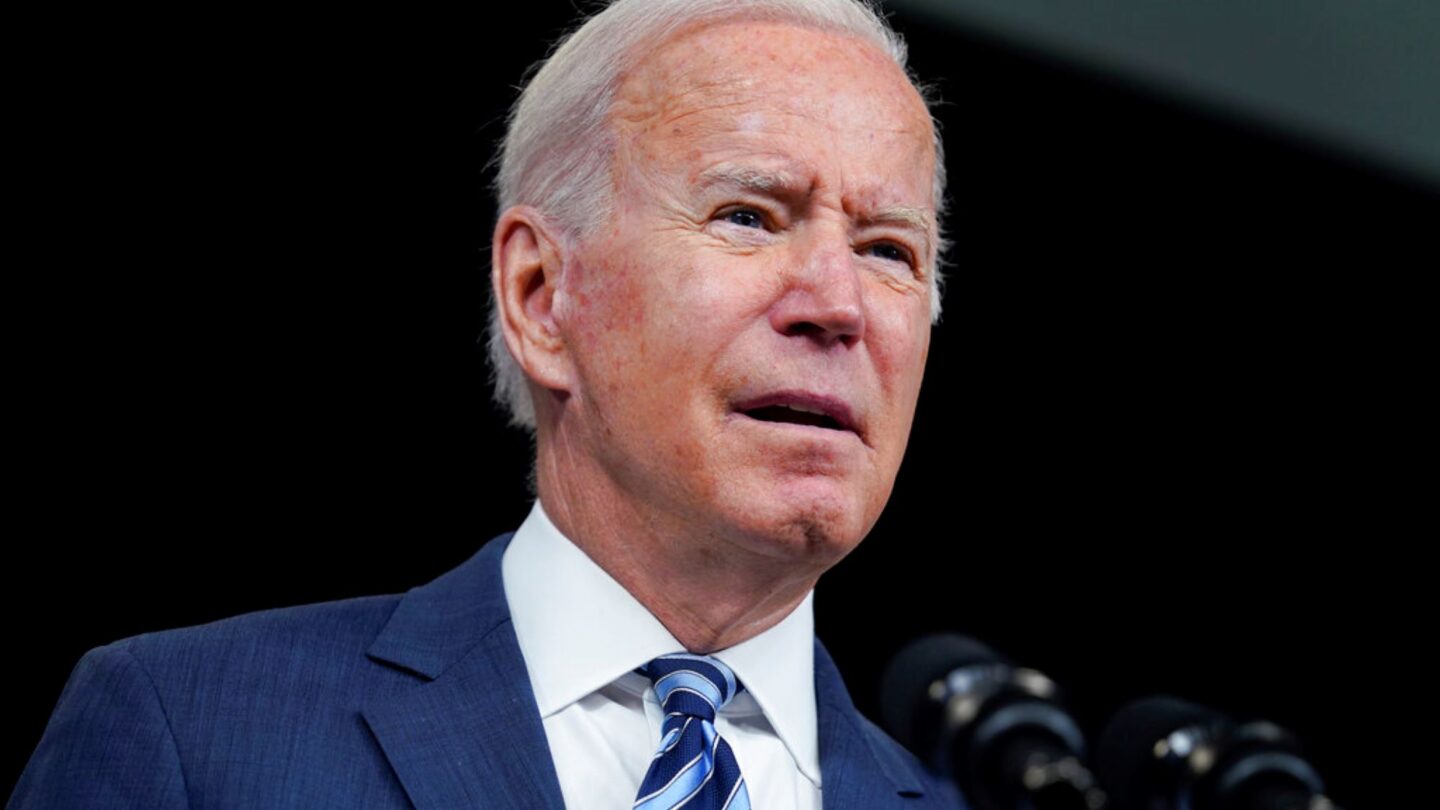With friends like these …
President Biden is facing his lowest approval rating since taking office, and it’s largely due to Democrats, the latest NPR/”PBS NewsHour”/Marist poll finds.
Biden’s approval rating in the poll is now at 36%. That’s a 4 percentage-point drop from June, and inside the numbers, it’s attributable to a 9-point decline within his own party.
While 75% of Democrats approve of the job Biden is doing, that’s considered low for a president’s own party. Last month, 84% of Democrats said they approved of the job Biden was doing, according to the survey.
Republicans and independents are far lower — just 5% of Republicans and only 28% of independents approve of the job Biden is doing. Those are unchanged from a month ago.
For context, Donald Trump’s approval within his party when he was president was never that low in the poll, not even after the Jan. 6 insurrection (77%) or the Charlottesville, Va., white supremacist demonstration (76%), at which one person was killed — and whose participants Trump dismissed as “very fine people, on both sides.”
In this survey, four times as many respondents said they strongly disapprove of the job Biden is doing than approve — 43% to 11%. And only 30% of Democrats said they strongly approve of the job the president is doing.
Biden has continually faced a lack of enthusiasm among his base. He was never progressives’ preferred choice for president, but many held their nose to vote for him against Trump.
That was certainly true for younger voters. In 2020, voters 45 and younger went for Biden by a 56%-42% margin, according to exit polls. But in this survey, 63% say they disapprove of the job Biden is doing. Just 30% approve, compared with 40% of those 45 and older.
Younger voters are also among the least enthusiastic about Biden — just 5% say they strongly approve of the job he’s doing, on par with whites without college degrees and white evangelical Christians, reliably Republican voters.
In his run for the White House, Biden promised progressives the political equivalent of the moon, but he has run into the realities of governing.
From voting rights and abortion to student debt and climate change measures, Biden has failed to convince enough senators to go along.
Often, it has been one Democratic senator in particular who has stood in the way and drawn progressives’ ire: Sen. Joe Manchin of West Virginia.
Many progressives, angry at the conservative lurch in the country due to recent Supreme Court decisions on guns and abortion, say they think Biden simply hasn’t acted boldly enough to fight for their initiatives.
They say he has also repeatedly folded in negotiations and put too much stock in the power of his personal relationships, particularly with Manchin.
Progressives bristle at the fact that Biden hasn’t pushed to punish Manchin by, for example, stripping him of his energy committee chairmanship.
That, however, would likely have cascading consequences. Democrats hold the Senate by the slimmest of majorities: 50-50, with Vice President Harris coming in to break ties.
If Manchin, who comes from a state that Trump won by 40 points in 2020, bolted to the Republican Party, that would hand the keys to the Senate over to Republican leader Mitch McConnell.
The result: no more Biden judges approved to federal benches or even the chance at any of progressives’ priorities passed, like Affordable Care Act subsidies.
Biden’s cratered approval numbers are a bad sign for Democrats in this midterm election year.
The party in power traditionally faces headwinds in a president’s first midterm, and when its president’s approval rating is this low, that can spell even more trouble.
That said, Democrats are outpacing Biden’s approval ratings in the congressional ballot, in which poll respondents are asked, if the election were held today, whether they would vote for the generic Democrat or Republican.
Democrats are doing the same in several Senate races as well. And while Republicans are still heavily favored to win control of the House, Democrats hope to stem the damage, in part because of increased Democratic enthusiasm to vote after the Supreme Court overturned Roe v. Wade, as they paint Republicans as extreme.
But questions are already beginning to emerge about the strength of a Biden 2024 reelection bid.
Not only are his approval ratings lower than those of any president at the same point in their presidencies since World War II, but he is facing inflation that’s the highest it has been in decades as well as high gas prices.
A recent New York Times/ Siena College poll found that two-thirds of Democrats said they preferred someone else to be their party’s standard-bearer in 2024, citing, principally, Biden’s age.
”We need a president with the vision, courage and power to achieve voting rights, a rapid transition to renewable energy, universal health care, access to abortion in all states, and controls on assault weapons and high-capacity magazines,” Pia Gallegos, who chairs the board of the progressive group RootsAction, which is circulating a petition for Biden not to run in 2024, said in an email. “President Biden has not shown himself to be the president we need.”
Finding a replacement, though, is easier dreamed than is practical. Vice President Harris’ favorability ratings in polls are about the same as or worse than Biden’s. Transportation Secretary Pete Buttigieg is slightly better liked, but not necessarily among Democrats.
Buttigieg also struggled with voters of color in the 2020 presidential primary, and you can’t win the Democratic nomination without winning nonwhite voters.
What’s more, Democratic strategists say, it would cause a firestorm within the party to be perceived as taking away the nomination from the first Black person, Asian American and woman to serve as vice president.
Biden owes his presidency, in large measure, to Black voters.
In the current NPR/”PBS NewsHour”/Marist survey, nonwhite voters give Biden a 40% approval rating, higher than whites did (34%), but not where Biden — or any Democrat — would want that figure to be.
All that said, in this age of polarization, Biden still seems to have at least an even-money chance of winning, particularly if it’s a rematch between him and Trump.
In that Siena poll, for example, Biden is slightly ahead of his predecessor, Trump, the leading potential GOP candidate at this point, by 3 points, well within the margin of error, but it shows the difference between approval ratings and election choices.
The survey of 1,160 adults was conducted July 11 through 17 and has a margin of error of +/- 4.1 percentage points. Respondents were reached using live callers via cellphone and landline.
Copyright 2022 NPR. To see more, visit https://www.npr.org.
9(MDAxODM0MDY4MDEyMTY4NDA3MzI3YjkzMw004))

9(MDAxODM0MDY4MDEyMTY4NDA3MzI3YjkzMw004))








